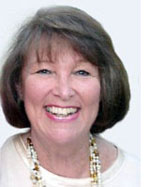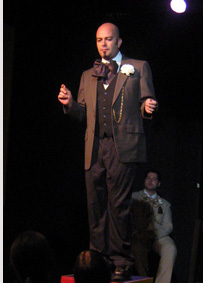|
By Cynthia Citron
 NORTH HOLLYWOOD, California— Moises Kaufman, an award-winning contemporary playwright, has much in common with many of his peers. He has participated in civil rights activities. NORTH HOLLYWOOD, California— Moises Kaufman, an award-winning contemporary playwright, has much in common with many of his peers. He has participated in civil rights activities.
He is Jewish. He is gay. And in one way or another, his life experiences form the crucial themes of his plays. Take, for example, his last production, "The Laramie Project," about the 1998 hate-murder of University of Wyoming gay student Matthew Shepard. And now, his latest offering, currently running at The Eclectic Company Theatre in North Hollywood, is yet another variation on that theme: it deals with the court trials of Irish playwright, poet, short story writer and all-around Renaissance man of the Victorian era, Oscar Wilde.
Those familiar with Wilde only for his bitingly witty maxims, will be introduced to the full aesthetic and political personality of this celebrated icon of the late 19th century in Kaufman’s Gross Indecency: The Three Trials of Oscar Wilde. Culled from letters, newspaper reports, transcripts of the actual trials, and Wilde’s own testimony and writings, the play is a powerful indictment of the mores of those times. While homosexuality was rampant among the British upper classes, especially in the elite boys’ schools, it was traditionally disregarded if conducted discretely.
On the other hand, buggery, or anal sex, had been ruled a felony punishable by death since 1533, under Henry Vlll. It was a sentence that remained on the books until 1861. In 1885 Queen Victoria added homosexuality to the Criminal Law Amendment Act (although she excluded lesbians since, as she asserted, women didn’t engage in that sort of activity). That law remained in effect until 1954, and homosexuality itself was not decriminalized in Britain until 1967.
Thus, in 1885, when Wilde initiated a lawsuit for libel against the 9th Marquess of Queensberry for circulating the accusation that Wilde was a “posing sodomite” (whatever that phrase means), Wilde entered a Kafkaesque world that eventually destroyed his life.
The Marquess had two homosexual sons, but he singled out the younger one, Lord Alfred Douglas, for his particular loathing and contempt. Lord Alfred, known as “Bosie”, was the on-again, off-again love of Oscar Wilde’s life, even to his death in 1900. Both of them had a multitude of partners, however, and Wilde, especially, was known to solicit young working-class boys and what’s known as “rough trade.”
Wilde, who was married and had fathered two sons, did not consider himself a homosexual. He was, he said, “about
Go to top of next column
| |
something else.” That “something else” was about his role as an artist, an aesthete, and as a philosopher in the manner of Plato and Socrates. In Gross Indecency Wilde is treated with sympathy by the playwright, as he was by many of his friends and his lawyers, even as he
 became a pariah in London. Ironically, one of his staunch supporters was George Bernard Shaw, a man who was his contemporary, having been born within two years of Wilde, but who outlived him by 50 years and remained a formidable intellectual figure until the middle of the 20th century. became a pariah in London. Ironically, one of his staunch supporters was George Bernard Shaw, a man who was his contemporary, having been born within two years of Wilde, but who outlived him by 50 years and remained a formidable intellectual figure until the middle of the 20th century.
In the first trial the prosecution (Wilde) dropped the case when the defense (Queensberry) threatened to produce some of the seedy young men that Wilde had been with. Immediately afterwards, however, he was arrested on a charge of “gross indecency.” Given enough time before the trial began to escape the country, Wilde stubbornly remained to fight, and the second trial ended with a hung jury. Finally, after being tried for a third time, Wilde was convicted and sentenced to two years’ hard labor.
During his incarceration he penned a 50,000-word letter to Lord Alfred Douglas, an expurgated version of which was published after Wilde’s death with the title De Profundis. Playwright Kaufman uses a number of moving quotes from this work in his play, as well as including Wilde’s tender explanation of “the love that dare not speak its name.”
Although Gross Indecency is an intensely engrossing play, it is a tad too long and more than a trifle repetitious. Many of the points that Wilde makes to justify his “artistic and aesthetic temperament” are made so many times that it almost becomes a case of “Methinks the gentleman doth protest too much.”
Further, director Susan Lee provides the most minimalist of sets: boxes that the nine performers mount to deliver their speeches. Each player delivers the lines of many different characters, without reference to whether the character is a man or a woman, and another mounted player then announces the source of the quotation. The players are mostly undifferentiated, except for Wilde, who is brilliantly performed by Kerr Seth Lordygan (pictured above right), and Lord Alfred Douglas (Joshua Grant), who really looks the part, ruby red lips and all.
In truth, Wilde---and Douglas especially---were not the sterling characters that Kaufman makes them out to be. Nevertheless, Wilde’s story is gripping and sad and Gross Indecency is worth seeing. It will run Fridays and Saturdays at 8 p.m. and Sundays at 7 through October 11th at The Eclectic Company Theatre, 5312 Laurel Canyon Blvd. in North Hollywood. Call 818-508-3003 for reservations.
|

